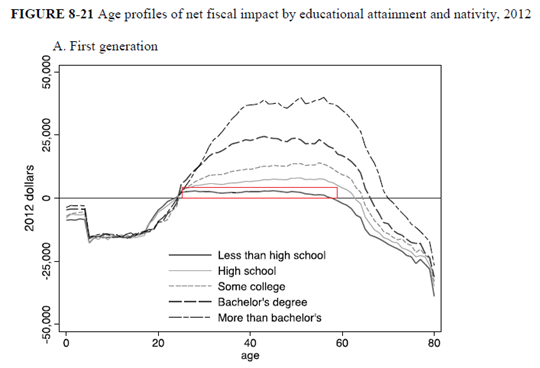1) Dramatically expanded high skilled immigration would improve federal and state budgets, while spurring economic growth.
The fiscal and economic benefits of high skilled immigration are
tremendous. The net value to the federal budget is between $210,000 and
$503,000 for each immigrant with a bachelor’s degree over their lifetime
(the full chart below highlights the overall impact). The sections on
immigrant entrepreneurship and innovation are also universally positive.
“High-skilled immigrants raise patenting per capita, which is likely to
boost productivity and per capita economic growth,” they conclude (p.
205).
Exempting spouses and children of legal immigrants, as Congress
intended, would
double the flow of high skilled immigrants, allowing the United States to capture these benefits.
2) Legalization could hasten assimilation.
One conclusion of the report is that wage and language assimilation is
lower among the 1995-1999 cohort of immigrants than among the 1975-1979
cohort. The rise of illegal immigration likely explains much of this
difference. More than one in four immigrants today is illegally present
in the United States. As Douglas Massey
has shown,
documented and undocumented immigrants had roughly the same wages until
the 1986 law banning employment of undocumented immigrants, which
depressed the wages of undocumented immigrants. Legalization would
reverse this.
Moreover, other studies have shown that immigrants who are legalized
rapidly increase
their earnings and invest in skills, including language acquisition. A
legalization program that specifically required language classes,
education, and workforce participation while restricting welfare, as the
2013 Senate-passed bill did, would further enhance the gains from
legalization.
3) A large guest worker program can mitigate the negative fiscal impacts of low-skilled immigration.
The most negative finding in the report is that the lowest skilled
immigrants have negative fiscal impacts, but those impacts are entirely
driven by costs in childhood and retirement, as the figure below from
the report shows (p. 331). A large guest worker program that allowed
low-skilled immigrants with less than a high school degree to enter
during their prime years and retire in their home country would be a
strong fiscal gain for the United States.

4) Governments should strengthen the wall around the welfare state. The positive fiscal gains from immigration could be improved by limiting immigrants’ access to benefits. As I
have shown before, immigrants overall did very well after benefits were partially restricted in 1996, and my colleagues
have detailed
a number of ways that these barriers could be reinforced. One
particular insight of the report is that most of the welfare usage comes
after retirement, so that should be a focus of reform.
There are many other implications of this report, but these four are enough for Congress to get started on."
No comments:
Post a Comment
Note: Only a member of this blog may post a comment.